

Edmund Husserl. Ludwig Wittgenstein. Ludwig Josef Johann Wittgenstein (26 April 1889 – 29 April 1951) was an Austrian-British philosopher who worked primarily in logic, the philosophy of mathematics, the philosophy of mind, and the philosophy of language.[4] From 1939–1947, Wittgenstein taught at the University of Cambridge.[5] During his lifetime he published just one slim book, the 75-page Tractatus Logico-Philosophicus (1921), one article, one book review and a children's dictionary.[6] His voluminous manuscripts were edited and published posthumously.
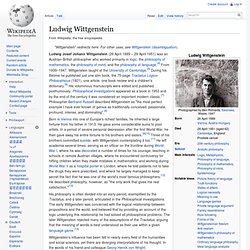
Philosophical Investigations appeared as a book in 1953 and by the end of the century it was considered an important modern classic.[7] Philosopher Bertrand Russell described Wittgenstein as "the most perfect example I have ever known of genius as traditionally conceived; passionate, profound, intense, and dominating".[8] Born in Vienna into one of Europe's richest families, he inherited a large fortune from his father in 1913.
Background[edit] The Wittgensteins[edit] Martin Heidegger. Martin Heidegger (German: [ˈmaɐ̯tiːn ˈhaɪdɛɡɐ]; 26 September 1889 – 26 May 1976) was a German philosopher, widely seen as a seminal thinker in the Continental tradition, particularly within the fields of existential phenomenology and philosophical hermeneutics.

From his beginnings as a Catholic academic, he developed a groundbreaking and widely influential philosophy. His relationship with Nazism has been a controversial and widely debated subject. For Heidegger, the things in lived experience always have more to them than what we can see; accordingly, the true nature of being is “withdrawal”. The interplay between the obscured reality of things and their appearance in what he calls the “clearing” is Heidegger's main theme. The presence of things for us is not their being, but merely their being interpreted as equipment according to a particular system of meaning and purpose.
John Dewey. John Dewey (/ˈduːi/; FAA October 20, 1859 – June 1, 1952) was an American philosopher, psychologist, and educational reformer whose ideas have been influential in education and social reform.
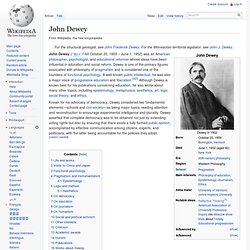
Max Weber. Karl Emil Maximilian "Max" Weber (German: [ˈmaks ˈveːbɐ]; 21 April 1864 – 14 June 1920) was a German sociologist, philosopher, and political economist whose ideas influenced social theory, social research, and the entire discipline of sociology.[3] Weber is often cited, with Émile Durkheim and Karl Marx, as among the three founding creators of sociology.[4][5][6] Weber also made a variety of other contributions in economic history, as well as economic theory and methodology.

Weber's analysis of modernity and rationalisation significantly influenced the critical theory associated with the Frankfurt School. William James. William James (January 11, 1842 – August 26, 1910) was an American philosopher and psychologist who was also trained as a physician.
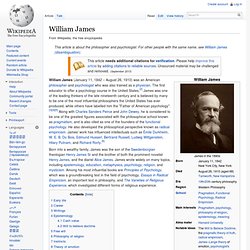
The first educator to offer a psychology course in the United States,[2] James was one of the leading thinkers of the late nineteenth century and is believed by many to be one of the most influential philosophers the United States has ever produced, while others have labelled him the "Father of American psychology".[3][4][5] Along with Charles Sanders Peirce and John Dewey, he is considered to be one of the greatest figures associated with the philosophical school known as pragmatism, and is also cited as one of the founders of the functional psychology. He also developed the philosophical perspective known as radical empiricism. James' work has influenced intellectuals such as Émile Durkheim, W.
E. B. Early life[edit] William James was born at the Astor House in New York City. He took up medical studies at The Harvard Medical School in 1864. A. J. Ayer. Sir Alfred Jules "Freddie" Ayer (/ɛər/; 29 October 1910 – 27 June 1989)[2] was a British philosopher known for his promotion of logical positivism, particularly in his books Language, Truth, and Logic (1936) and The Problem of Knowledge (1956).
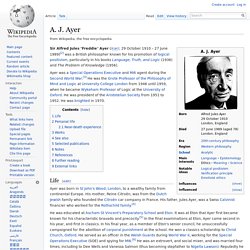
Ayer was a Special Operations Executive and MI6 agent during the Second World War.[3] He was the Grote Professor of the Philosophy of Mind and Logic at University College London from 1946 until 1959, when he became Wykeham Professor of Logic at the University of Oxford. He was president of the Aristotelian Society from 1951 to 1952. He was knighted in 1970. Life[edit] Ayer was born in St John's Wood, London, to a wealthy family from continental Europe.
He was educated at Ascham St Vincent's Preparatory School and Eton. Sigmund Freud. Sigmund Freud (/frɔɪd/;[2] German pronunciation: [ˈziːkmʊnt ˈfʁɔʏ̯t]; born Sigismund Schlomo Freud; 6 May 1856 – 23 September 1939) was an Austrian neurologist, now known as the father of psychoanalysis.
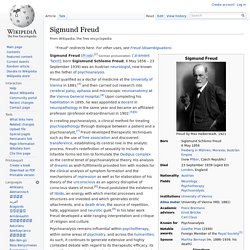
Freud qualified as a doctor of medicine at the University of Vienna in 1881,[3] and then carried out research into cerebral palsy, aphasia and microscopic neuroanatomy at the Vienna General Hospital.[4] Upon completing his habilitation in 1895, he was appointed a docent in neuropathology in the same year and became an affiliated professor (professor extraordinarius) in 1902.[5][6] Psychoanalysis remains influential within psychotherapy, within some areas of psychiatry, and across the humanities. As such, it continues to generate extensive and highly contested debate with regard to its therapeutic efficacy, its scientific status, and whether it advances or is detrimental to the feminist cause.[10] Nonetheless, Freud's work has suffused contemporary Western thought and popular culture.